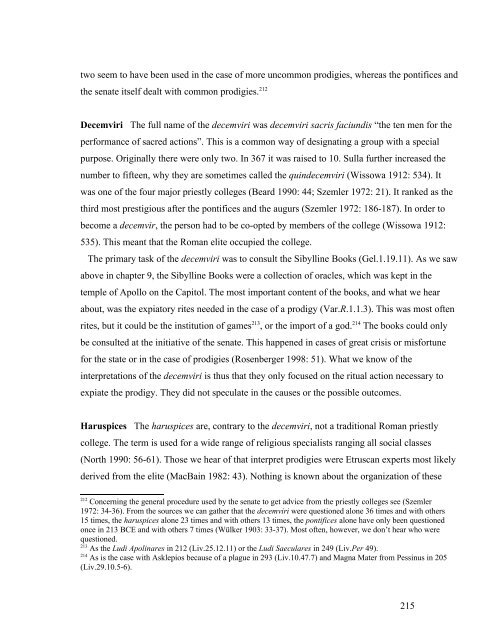The dissemination of divination in roman republican times
The dissemination of divination in roman republican times
The dissemination of divination in roman republican times
You also want an ePaper? Increase the reach of your titles
YUMPU automatically turns print PDFs into web optimized ePapers that Google loves.
two seem to have been used <strong>in</strong> the case <strong>of</strong> more uncommon prodigies, whereas the pontifices and<br />
the senate itself dealt with common prodigies. 212<br />
Decemviri <strong>The</strong> full name <strong>of</strong> the decemviri was decemviri sacris faciundis “the ten men for the<br />
performance <strong>of</strong> sacred actions”. This is a common way <strong>of</strong> designat<strong>in</strong>g a group with a special<br />
purpose. Orig<strong>in</strong>ally there were only two. In 367 it was raised to 10. Sulla further <strong>in</strong>creased the<br />
number to fifteen, why they are some<strong>times</strong> called the qu<strong>in</strong>decemviri (Wissowa 1912: 534). It<br />
was one <strong>of</strong> the four major priestly colleges (Beard 1990: 44; Szemler 1972: 21). It ranked as the<br />
third most prestigious after the pontifices and the augurs (Szemler 1972: 186-187). In order to<br />
become a decemvir, the person had to be co-opted by members <strong>of</strong> the college (Wissowa 1912:<br />
535). This meant that the Roman elite occupied the college.<br />
<strong>The</strong> primary task <strong>of</strong> the decemviri was to consult the Sibyll<strong>in</strong>e Books (Gel.1.19.11). As we saw<br />
above <strong>in</strong> chapter 9, the Sibyll<strong>in</strong>e Books were a collection <strong>of</strong> oracles, which was kept <strong>in</strong> the<br />
temple <strong>of</strong> Apollo on the Capitol. <strong>The</strong> most important content <strong>of</strong> the books, and what we hear<br />
about, was the expiatory rites needed <strong>in</strong> the case <strong>of</strong> a prodigy (Var.R.1.1.3). This was most <strong>of</strong>ten<br />
rites, but it could be the <strong>in</strong>stitution <strong>of</strong> games 213 , or the import <strong>of</strong> a god. 214 <strong>The</strong> books could only<br />
be consulted at the <strong>in</strong>itiative <strong>of</strong> the senate. This happened <strong>in</strong> cases <strong>of</strong> great crisis or misfortune<br />
for the state or <strong>in</strong> the case <strong>of</strong> prodigies (Rosenberger 1998: 51). What we know <strong>of</strong> the<br />
<strong>in</strong>terpretations <strong>of</strong> the decemviri is thus that they only focused on the ritual action necessary to<br />
expiate the prodigy. <strong>The</strong>y did not speculate <strong>in</strong> the causes or the possible outcomes.<br />
Haruspices <strong>The</strong> haruspices are, contrary to the decemviri, not a traditional Roman priestly<br />
college. <strong>The</strong> term is used for a wide range <strong>of</strong> religious specialists rang<strong>in</strong>g all social classes<br />
(North 1990: 56-61). Those we hear <strong>of</strong> that <strong>in</strong>terpret prodigies were Etruscan experts most likely<br />
derived from the elite (MacBa<strong>in</strong> 1982: 43). Noth<strong>in</strong>g is known about the organization <strong>of</strong> these<br />
212 Concern<strong>in</strong>g the general procedure used by the senate to get advice from the priestly colleges see (Szemler<br />
1972: 34-36). From the sources we can gather that the decemviri were questioned alone 36 <strong>times</strong> and with others<br />
15 <strong>times</strong>, the haruspices alone 23 <strong>times</strong> and with others 13 <strong>times</strong>, the pontifices alone have only been questioned<br />
once <strong>in</strong> 213 BCE and with others 7 <strong>times</strong> (Wülker 1903: 33-37). Most <strong>of</strong>ten, however, we don’t hear who were<br />
questioned.<br />
213 As the Ludi Apol<strong>in</strong>ares <strong>in</strong> 212 (Liv.25.12.11) or the Ludi Saeculares <strong>in</strong> 249 (Liv.Per 49).<br />
214 As is the case with Asklepios because <strong>of</strong> a plague <strong>in</strong> 293 (Liv.10.47.7) and Magna Mater from Pess<strong>in</strong>us <strong>in</strong> 205<br />
(Liv.29.10.5-6).<br />
215


